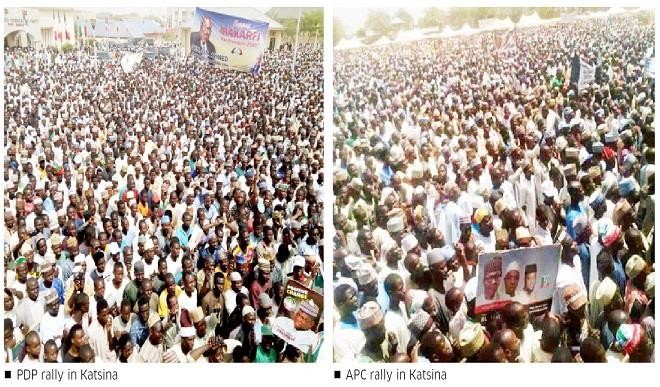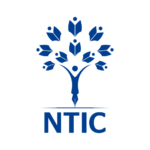Political parties and presidential candidates have only four days left to ensure that their message sinks in with voters, so it is important to know which of the many tactics they are using in this campaign is the most efficacious. The most prominent campaign activity this election season has been the mega rallies. Even though the campaigns started fairly late, the two leading parties, APC and PDP, have in the past month staged spectacular rallies in almost all the states of the federation.
Turn out at these rallies is a factor of the popularity of the presidential candidate but also of his party’s ability to mobilise people from all over the state to attend the rally. Rural and semi-urban Nigerians are often eager to go to any exciting event in the state capital. All that politicians do is to line up vehicles near the motor park, promise anyone who enters that he will be taken to the rally ground and back, be given food to eat and be given an honorarium of N500. All the vehicles will be filled to the brim. The same people may however go to your opponents’ rally the next day.
How useful is a mega rally in election campaigns? It excites your supporters, intimidates opponents, impresses onlookers, attracts fence sitters and justifies a subsequent election win. It is however costly to organize, difficult to control, a security nightmare and very stressful for the candidates. Mega rallies are often so rowdy that the speeches are barely audible and any small protocol flip by the organisers could antagonize powerful party figures. For the candidates too, mega rally is too rowdy for organized thought and refined speech; the best you can do is to shout your party’s name several times.
Over the years, it was Nigerian politicians with the greatest oratorical skills and rhetorical flourish that made the most impact at mega rallies. Such rare men included Dr. Nnamdi Azikiwe, Yusuf Maitama Sule, K.O. Mbadiwe, Adegoke Adelabu, Abubakar Rimi, Sabo Bakin Zuwo and Dr. Chuba Okadigbo. Unless we have such men of dazzling oratory, Nigerian political parties should consider scrapping mega rallies in the future and instead adopt more of the smaller but more numerous campaign events that we see in Europe and North America.
During this election cycle, many parties also held town hall meetings. Here the audience is smaller and participants are able to fire questions at the candidates. This format appeals to elite audiences but the poor voters probably do not watch it. For a candidate, this format offers the chance to make a slip, which opponents will then cash on and spread through the social media. A variety of this format is television debate, some of which was done in this election cycle. Trouble is, the big candidates avoided a direct televised debate while the smaller candidates were eager to share the stage with big candidates.
I do not blame President Buhari for dodging the debate and I do not blame Atiku Abubakar for walking away when he found out that Buhari was not there. Television debates tend to focus on appearance and mannerisms more than substance. David Halberstam told stories in The Powers That Be of many behind-the-scenes manoeuvres that took place before the US’s first televised debate between John Kennedy and Richard Nixon in 1960. Kennedy’s smart staff members anticipated everything, including the political danger of rubbing powder on their candidate’s face before going on air. So when the producer popped in and said, “Powder for you, Mr. Kennedy?” The candidate said, “F… you!” Meanwhile his aide dashed to a nearby drug store, bought the powder and secretly applied it on Kennedy’s face.
Before mega rallies and television debates, there were posters. Up until 2015, posters were the most prominent campaign tool in Nigeria but this year, they suffered a decline. This was partly because city authorities discouraged their pasting on every available wall. A Nigerian politician usually announces his bid through posters. The earliest posters often had no party logos; the aspirant was testing the waters before deciding which party to join.
More prominent than posters are giant billboards. Billboards are very expensive but they are worth the price, especially when they are placed at strategic approaches to a major city. Tens of thousands of motorists view them every day, especially when they have a catchy message. One of the catchiest messages was Dr. Goodluck Jonathan’s 2011 message, ‘A breath of fresh air.’ Jonathan could not however repeat the message in 2015 because his administration was by then enveloped in charges of massive sleaze.
Then there are newspaper ads, which also suffered a decline this year. Years ago, these ads were as prominent during the election season as were wall posters but newspaper circulation is no longer what it used to be. These ads however reach elite audiences and could be seen in offices and homes. Radio ads were somewhat prominent this year, but they mostly featured as sponsored features. Radios reach very large audiences and are especially potent in the rural areas, which is why many state governments do not allow opponents to share them even when they pay. Radio audiences tend to be the masses, not the elite. Television has less reach than radio but tv ads are more impactful because of the picture element. This year, the big parties spent fortunes to broadcast live their mega rallies and town hall meetings, but we did not have the controversial TV documentaries that we had in 2015.
Social media campaigns were only slightly less poisonous this year than they were in 2015. This year’s presidential election campaign is more temperate than 2015’s because of the regional and religious uniformity of the two major candidates. Still, it was noticeable that youthful social media campaigners spent more time disparaging the candidates they didn’t like more than they spent promoting the ones they like. Fake news, photoshops, hate speeches and make-believe scandals were a good part of the social media menu.
Parties and candidates paid a lot of attention to special target groups such as youth and women groups, churches, physically challenged and some trade groups. Not much effort was made to attract organized labour, which the major parties probably think is left-wing and beyond control. President Buhari in particular met with business groups in Lagos but his message to them was not sharp. Wooing clerics was a tricky business because it is a double-edged sword that strikes well in some sectors but backfires in others.
Yet another campaign strategy is the door to door campaign. Parties often leave this element to candidates’ wives, women’s wings and support groups. In Nigeria, candidates’ wives often do a very good job of it because they move around in the night, enter houses, meet housewives and distribute souvenirs, milk, sugar, salt and plastic cups. It is made more effective when there is a woman in charge of a street and on election day, she ensures that recipients of the largesse turn up at the polls.
When all is said and done however, campaign tactic is not more important than the overall character and message of the major party candidates. Most Nigerian voters decide who they will vote for fairly early in the election season, usually based on primordial factors, personal association, regional groupthink and their perception of the candidates’ track record. Some minds could be changed along the way, usually due to personal enticement or promise of a job, contract, hajj seat or fertilizer supply.
I do not have much to say about the candidates’ campaign message. Too much energy is channeled into various strategies and tactics of mobilization, without much thought for campaign programs. In all this campaign season which is already coming to an end, I cannot remember one catchy, thoughtful promise that either major [or even minor] candidate made. Usually in Nigeria, a person produces his program after he wins the election, not before.




